Mark Bailey: Wrong plant, wrong place

A chasm exists between what is possible and what is actual. Here in North Central Florida, there are many plants that have the potential to grow well yet fail to thrive. Not only do they fail to thrive, they waste time, effort and money. There is a reason for that. It’s the wrong plant in the wrong place. A plant that is not well-adapted to the region or to local conditions will consistently disappoint growers. It is essential that the plant’s needs are understood before planting.
When it comes to the garden, there are going to be challenges growing any crop; however, certain crops are more difficult to grow than others. Some of the most commonly attempted crops are corn, cucumbers, okra, pumpkins, squash, strawberries and tomatoes. Each of these have the potential to grow well, yet they quite often end in disaster. For example, tomatoes are one of the most desirable crops in many people’s gardens, yet they are very susceptible to a wide range of pests and plant pathogens. In order to keep a tomato plant thriving, they usually require insecticides and antimicrobial applications on a regular basis. Yes, this can be done, and often is, but reliance on pesticides is not sustainable over the long term. Luckily, there are several crops that require a minimum of inputs. At the top of the list is the sweet potato, which is extremely productive, well-adapted and nutrient-dense. Other good options are leafy greens, such as Swiss chard, Irish potatoes and radishes. Each crop will have a range of planting dates and specific requirements that will support a successful harvest.
Far too often a fruit tree is planted for no other reason than the desirable fruit it can potentially yield. That’s not unreasonable, but the next thought should be about whether or not the fruit tree can actually be grown in the area. Apples, avocadoes, bananas, peaches and pomegranates are a few examples of fruit trees that could possibly grow well, yet often fail to thrive. They fail to thrive because it’s most likely the wrong plant in the wrong place. Apples, pears, peaches, plums and nectarines typically require long, cool winters to consistently flower and produce fruit. North Central Florida has inconsistent cool winters that greatly affect plants that need chill-hour accumulation. While we may be too far south for consistent cold winters, we also are too far north for year-round tropical conditions. Crops such as bananas, papaya and avocados can struggle to survive cold winters. In all cases, specific varieties will need to be carefully selected prior to planting. The ideal fruit plant is going to be one that can survive the extreme heat and freezing temperatures, and is pest-resistant and self-sufficient. Some fruit plants that are well-adapted to local conditions are loquats, mulberries, persimmons, muscadine grapes and figs.
There are, no doubt, rare exceptions of successfully growing poorly adapted plants, but the focus should always be on the rule, not the exception to it. If a plant needs constant protection, irrigation, pesticides and fertilizers to stay alive, it should not be planted. One of the first things to consider is if a plant is well-adapted to the general region of North Central Florida. If it is, then consider if it is well-adapted to the specific conditions of your yard or farm. Before you plant, take the time to understand the plant’s needs, then choose the right plant for the right place.
For more information, call the Marion County Extension office at 671-8400 or ironhill@ufl.edu
— Mark Bailey is the Sustainable Agriculture & Food Systems Extension Agent for UF/IFAS Extension Marion County. For more information, contact the Marion County office at 671-8400. The Extension Service is located at 2232 NE Jacksonville Road, Ocala, FL 34470.
This article originally appeared on The Gainesville Sun: Mark Bailey: Wrong plant, wrong place

 money
money 